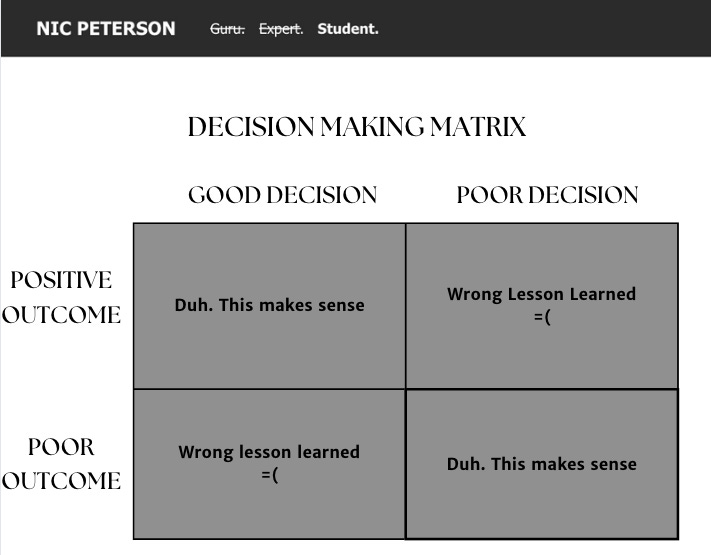Brain Sludge And Self Respect
Level 3: Master Of Mundane
“Most prefer the certainty of misery to the misery of uncertainty”
-Virginia Satir
Future Guardian,
Ever feel like you’re not as energetic, focused or motivated as you used to be?
Good news, it’s not because you’re getting old. It’s probably because you’ve been accumulating what we call “brain sludge”
Brain Sludge is an extension of Recapture and Reallocate and will help you recapture energy, focus, and motivation, quickly.
First a quick overview of volatility and how it relate to velocity.
Volatility And Velocity
Velocity is simply speed with a vector component, the rate at which you are moving in a specific direction. Remember, you can move at a high speed in a big circle or in the wrong direction, velocity is taking into account the direction of the movement.
If you've been following the syllabus you should have a base knowledge regarding volatility and velocity from Recapture And Reallocate1.
Imagine driving along a road at 60mph.
If the road is a straight line between where you are at and where you’re desired destination, it will have a high velocity; you have covered more ground toward the goal.
If the road is curvy, you’ll still be traveling at the same speed, 60mph, but will not make as much progress in the desired direction.
The takeaway?
Driving volatility down increases velocity.
The more time spent off track, the longer it will take to get there - even if you are moving at a higher speed.
What nobody wants to talk about though is emotional volatility; cognitive peaks and valleys. See the adaptive dilemma for a deeper dive on why.2
Emotional And Cognitive Peaks And Valleys
It feels good to be at a peak but what doesn't feel so good is the valley that comes after it. Remember that a "loss" feels worse than an equal amount of gain, and ultimately you lose more resources when you are in an emotional or cognitive valley. It is incalculable how much time, effort, energy, or money is hemorrhaged when you are confused about how you feel, your brain isn't "right", or in an emotional doom loop.
There are two major frameworks to help you recapture the time spent “off track”, both will help you recovery attention, attention and motivation.
The Skills- Challenge Matrix.
The Outcome Bias Doom Loop.
The Skills Challenge Matrix
Recapture Emotion, Motivation, Time, and Bandwidth.
"I used to be able to line this up and knock it down, now I can't get motivated to get it done. Where is my motivation? I must be getting old."
Sound familiar?
Before you blame your age, let me introduce you to the Skills Challenge Matrix. It looks like this:
Activities falls somewhere on the following matrix:
High Skill, High Effort: If you are an entrepreneur this will be what is referred to as "flow".
High Skill, Low Effort: Catharsis.
Low Skill, High Effort: Hard Work.
Low Skill, Low Effort: Kill Time.
It’s a spectrum and these may vary between people's personalities.
Example Of Skills Challenge Matrix
Last year you decided that you wanted to learn how to play a guitar, build a funnel for your business, and write compelling copy. These skills might be low skill, low effort for someone who's done it successfully for 10 years. While for you starting out, it would be high skill, high effort putting you into a flow state as you learn it.
You're a chess master which is a high skill game, but when you're playing against your family you don't need to try very hard.
Most manual labor, like chopping wood, especially on a deadline will fall under low skill, high effort.
Admin work that can be taught and done by anyone, like filing papers will fall under low skill, low effort.
Last year you would wake up at 5AM and be able to work until 5PM on your funnel and copy writing. This year, you're staring at the wall unable to get yourself to build a funnel and it takes you hours to write copy.
Not because you don't know what to write but something else always steals your attention.
What's wrong with you? Instead of going the route of:
"You just need more motivation."
"Set better goals for yourself."
"Maybe you have low testosterone/estrogen."
The Skills Challenge Matrix introduces a different narrative:
The skills that you’ve mastered have moved quadrants.
You got so good at the guitar you can just pick it up and play it and now it's cathartic for you, no longer putting you into a flow state. Writing compelling copy and build funnels is natural for you - it’s not longer high effort.
The same tasks can fall in different quadrants. Same skills, entirely different psychological state.
There might be nothing wrong at all with you, haven’t properly categorized the tasks you do. The good news is that these are all things you can recapture and reallocate. If you're entrepreneurial (a "go getter") you probably need to have things in the high skill, high effort flow state or else you're living in a psychological state of apathy and boredom.
You just have to know yourself and recognize when an activity has switched quadrants.
Improper categorization and resource allocation in this fashion can lead to days, weeks, or even months of nothing getting done because you can't find the "motivation".
It's not that you used to be able to build funnels for 8 hours, you used to be able to do "flow" activities for 8 hours. See the difference?
You can still do "flow" activities for 8 hours, you just need to figure out what those activities are and it's no longer building funnels.
The Outcome Bias Doom Loop
[Excerpt from Nic Peterson’s newsletter:]3
In every program I make and before each speaking gig, I stress the importance of "open loops"1
Letting yourself be uncertain about something - just for a little bit - before trying to make sense of it. Your brain will fight like hell to close a loop because it doesn't want to sit with uncertainty. Uncertainty makes us feel less intelligent, so we fight it.
That's a problem.
Cognitively lazy people will struggle with this newsletter. Not just this one post, all of them.
One of the most dangerous combinations is cognitive laziness and outcome bias.
Outcome Bias: judging a person or decision based on the outcome instead of the logic, reasoning, and evidence.
I am wary of anyone who claims to be focused on outcomes. Counterintuitive? Maybe.
Let's play it out:
I have a friend that stayed up late last night. he was hoping to win ten million bucks playing Russian Roulette. And he did - he won.
I decided I would go to bed early so that I could wake up early and refine my writing skills.
If you believe the outcome is the best way to judge a decision, you must believe that my friend made a better decision than I did - he had a better outcome.
As anyone that plays poker knows, you can play a hand perfectly and lose to an idiot.
Why?
Because randomness will always exist.
And since randomness will always exist…
A good decision can have an unfavorable outcome and a shitty decision can have a favorable one. Judging only the outcome, a lazy brain will learn the wrong things.
For example, it might "learn" that gambling with your life is a better decision than developing skills.
...and then that same lazy brain will reposition people (including self) - mistaking luck for competence.
Smart people that make good decisions can have a bad outcome, because of randomness.
Stupid ass people that make a bad decision have a favorable outcome, because of randomness.
.. and then smart people can start to doubt themselves and other smart people and begin to trust idiots…because of randomness.
Dunning-Kruger. It' very real.
Quickly making sense of things is cognitively lazy - and robbing yourself of an opportunity to learn the right lesson.
Instead of thinking deeply about the logic, reasoning and evidence of a decision, a convenient story is created to put your brain at ease. Your expectations become a byproduct of an incomplete, fabricated experience.
This convenient story leads to mislabeling yourself and others.
...and then you start prophesizing about the future.
These prophesiers are the worst.
They are so certain of themselves at all times. They are also angry at all times because reality never unfolds as they expect.
When reality doesn't meet their expectation they become toxic and polarizing. It's easy to spot them because they sit around, mad at everyone, waiting for a single outcome or data point to validate their world view.
Don’t be this person.
Judge the logic, reason, and evidence of a decision, not the outcome.
Assign respect and authority to the quality of logic, reasoning, and evidence a person uses when making decisions - not the outcome.
Not a single, outcome, at least.
Self Respect
You will be surprised how much respect you have assigned to lucky people, mistaking their luck for skill. You will also realize how much respect you have robbed from yourself mistaking bad luck for lack of skill. Once you know where to look, you can recapture the misplaced respect and reallocate it properly.
Lack of self-respect is often just having learned the wrong lesson and misplacing yourself relative to others.
Free articles are sent every Monday. Upgrade to paid to get Friday high-level paid posts, strategies, tactics and tools plus Guardian Academy Bonuses and Workshops.
6WU- Wisdom Comes From Multiple Perspectives
Can you summarize what you've learned into six words? Share them on the thread below so that others can also benefit from your wisdom. After you've shared be sure to read through what others have said as well to see what you can take away.
https://twitter.com/TheGuardianAcad/status/1617922676378435584?s=20&t=ZXIHN2B-CqQpvCHwImF5mQ
Listen: Apple Podcasts | Spotify
Hope you find this useful,
Guardian Academy










